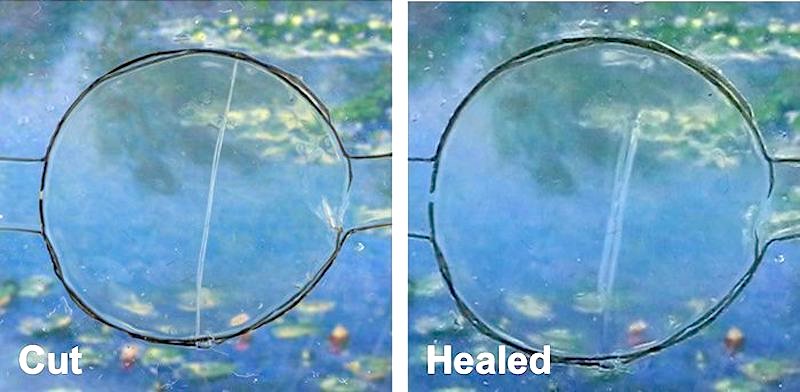New material self-heals like Wolverine, stretches like Mr. Fantastic

On April 4 at the National Meeting & Exposition of the American Chemical Society, researchers from the University of California, Riverside, presented a rubber-like material that is stretchable and transparent, conducts ions to generate current and can heal itself from an open wound to regain all its fantastic properties.
“When I was young, my idol was Wolverine from the X-Men,” lead researcher Chao Wang says in a press release. “He could save the world, but only because he could heal himself. A self-healing material, when carved into two parts, can go back together like nothing has happened, just like our human skin. I’ve been researching making a self-healing lithium ion battery, so when you drop your cell phone, it could fix itself and last much longer.”
If both stretchable, transparent conductive materials and self-healing materials have been developed before, this is the first time all key properties are present in a single substance. The trick, according to Chao Wang, is to use dynamic chemical bonds called ion-dipole interactions, which create an electrostatic attraction between molecules of elastic polar polymer and charged ionic salt. The resulting conductive material can stretch up to 50 times its original size, and after being cut in two, can solder itself back together at room temperature within 48 hours.

For now, the team is still researching how to make the material more resistant under a broader range of conditions, for example by developing a hydrophobic polymer system that would resist humidity. Chao Wang stresses that the material is not yet safely biocompatible—although the team has tested it on an “artificial muscle”, which moved in response to electrical signals—but that “wearables are certainly a trend to explore”.
Wang predicts that this new self-healing conductive material will be used for smartphone screens, batteries and other electronic devices within the next three years. Before the self-healing muscle, the self-soldering robot?
Watch the press conference at the meeting of the American Chemical Society
